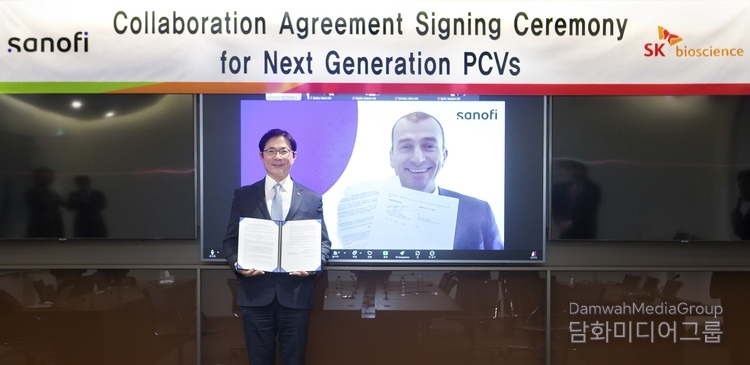By Diplomacy Journal Lee Kap-soo
SK bioscience and Sanofi announced on Dec. 23 the signing of an expanded agreement to co-develop next-generation pneumococcal conjugate vaccines (PCVs) for both pediatric and adult populations, with the potential to provide broader protection than those currently licensed.
This agreement builds on the companies’ existing collaboration to develop and commercialize the GBP410, a 21-valent pneumococcal conjugate pediatric vaccine candidate. Together, the companies aim to develop innovative next-generation PCVs beyond GBP410.

At the same time, SK bioscience and Sanofi are one step closer to commercializing GBP410 by initiating the phase 3 clinical program. GBP410 is the first pneumococcal conjugate vaccine candidate with more than 20 serotypes to enter phase 3 in infants and toddlers, making it a highly anticipated innovation in the market.
Extended agreement, including KRW 75.5 billion upfront and potential milestones, allows broader development scope from pediatric vaccines to adult vaccines.
Under the terms of the agreement to co-develop next-generation PCVs, Sanofi will pay SK bioscience an upfront payment of EUR 50 million (KRW 75.5 billion) followed by development and commercial milestone payments.
Thomas Triomphe, Executive Vice President, Vaccines, Sanofi, said, “Given the vast unmet public health needs in IPD, we’re delighted to extend this collaboration and continue our pursuit of innovative work in PCV. Our collaboration leverages SK bioscience’s capabilities and Sanofi’s expertise in developing and brining innovative vaccines to people worldwide with the collective aim of reducing the global impact of pneumococcal disease.”
Jaeyong Ahn, CEO of SK bioscience, said, “Our decision to develop next-generation PCVs and simultaneously initiate phase 3 clinical program for GBP410 reflects the GBP410’s high potential for success, a promising market outlook, and our strong mutual trust. As Korea’s leading company in the vaccine and bio industry, we are committed to successfully bringing vaccines with blockbuster potential to market that will secure vaccine sovereignty, contribute to global health, and lead the global market.”
